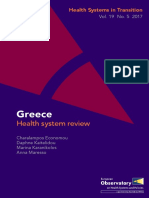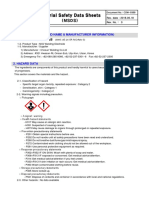Radical Verbs
Radical Verbs
Uploaded by
Lumina lOriginal Title
Copyright
Available Formats
Share this document
Did you find this document useful?
Is this content inappropriate?
Report this DocumentCopyright:
Available Formats
Radical Verbs
Radical Verbs
Uploaded by
Lumina lCopyright:
Available Formats
RADICAL VERBS
Some verbs have vowel changes in the present tense for all forms
except first and second person plural. After dropping the endings (-ar, -
er, or -ir), the e of the last syllable changes to ie, and o of the last
syllable changes to ue. Some -ir verbs change e of the last syllable
to i, while verbs ending in -uir change the i to y for all forms except
first and second plural. Note that these irregularities do NOT apply to
vos conjugations.
e to ie o to ue e to i ui to uy
pensar - to think contar - to count pedir - to ask (for) construir - to
querer - to want, like, poder - to be able repetir - to repeat build
love costar - to cost seguir - to follow, go
cerrar - to close dormir - to sleep on
comenzar - to begin encontrar - to find, servir - to serve
despertar - to awaken meet vestir - to dress
empezar - to begin jugar - to play
entender - to morir - to die
understand mostrar - to show
perder - to lose volar - to fly
preferir - to prefer volver - to return
sentar - to seat
sentir - to regret, feel
(Vos present conjugation and preterite, imperfect and future tenses not
recorded yet)
pensar contar pedir construir
(yo) pienso cuento pido construyo
(tú / vos) piensas / cuentas / pides / pedís construyes /
pensás cuentás construís
(él / ella / piensa cuenta pide construye
usted)
(nosotros / pensamos contamos pedimos construimos
nosotras)
(vosotros / pensáis contáis pedís construís
vosotras)
(ellos / ellas / piensan cuentan piden construyen
ustedes)
A few other verbs are irregular only in the first person singular form. The
rest of the forms tend to follow the regular pattern:
traer to carry traigo I carry
salir to go out salgo I go out
hacer to do hago I do
saber to know sé I know
dar to give doy I give
ver to see veo I see
tener to have tengo I have
poner to put pongo I put
decir to say digo I say
valer to be worth valgo I am worth
caer to fall caigo I fall
conocer to know conozco I know
deducir to deduce deduzco I deduce
caber to fit quepo I fit
Generally, verbs that end in -cer and -cir add z before the first person
singular ending.
We have already seen verbs that are irregular in all conjugations in the
present tense, such as ir and ser. Another irregular verb is haber - to
have or the impersonal there is/are; however, it is different from tener
(which also means to have) because it is not used to show possession. It
is only used in compound tenses as a helping verb, i.e. I have seen that
movie, which will be covered in Spanish III.
The three completely irregular verbs in the present tense are: (not
recorded yet)
ser - to be ir - to go haber - to
have
(yo) soy voy he
(tú / vos) eres / sos vas has
(él / ella / es va ha
usted)
(nosotros / somos vamos hemos
nosotras)
(vosotros / sois vais habéis
vosotras)
(ellos / ellas / son van han
ustedes)
An impersonal conjugation of haber, hay, is used to mean there
is/are in English.
29. Reflexive Verbs
The subject and the object are the same with reflexive verbs - the
subject acts upon itself. A reflexive verb in Spanish will be marked
with se attached to the end of the infinitive. These verbs are
conjugated like regular verbs, except the reflexive pronoun agrees with
gender and number and precedes the verb when it is conjugated.
Reciprocal verbs are conjugated the same as reflexive except the action
passes from one person to another. Reflexive verbs sometimes use the
"-self" forms in English, while the reciprocal verbs use "each other."
acordarse - to dormirse - to fall
remember asleep
acostarse - to go irse - to go
to bed away/leave
atreverse - to levantarse - to
dare get/stand up
bañarse - to take sentarse - to sit
a bath down
casarse - to get quedarse - to
married stay/remain
despertarse - to quejarse - to
wake up complain
desvestirse - to vestirse - to get
get undressed dressed
The reflexive pronouns are me, te, se, nos, os and se and they are
placed before the conjugated verb:
(yo) me acuerdo I remember
(tú / vos) te acuerdas / te acordás you remember
(él / ella / usted) se acuerda he/she/you
remember
(nosotros / nos acordamos we remember
nosotras)
(vosotros / os acordáis you remember
vosotras)
(ellos / ellas / se acuerdan they/you
ustedes) remember
However, when the reflexive verb is in the infinitive and used with
another verb, the reflexive pronoun must still agree with the subject of
the conjugated verb. It is either attached to the end of the reflexive verb
or placed before the conjugated verb:
Vamos a casarnos. / Nos vamos a casar. We're going to get married.
Tengo que irme. / Me tengo que ir. I have to go.
Puede quedarse contigo? / Se puede quedar contigo? Can he stay with
you?
The verb contarse is used colloquially to ask how's it going (with
you)? ¿Qué te cuentas ?
You might also like
- The Subtle Art of Not Giving a F*ck: A Counterintuitive Approach to Living a Good LifeFrom EverandThe Subtle Art of Not Giving a F*ck: A Counterintuitive Approach to Living a Good LifeRating: 4 out of 5 stars4/5 (5868)
- The Gifts of Imperfection: Let Go of Who You Think You're Supposed to Be and Embrace Who You AreFrom EverandThe Gifts of Imperfection: Let Go of Who You Think You're Supposed to Be and Embrace Who You AreRating: 4 out of 5 stars4/5 (1095)
- Never Split the Difference: Negotiating As If Your Life Depended On ItFrom EverandNever Split the Difference: Negotiating As If Your Life Depended On ItRating: 4.5 out of 5 stars4.5/5 (866)
- Grit: The Power of Passion and PerseveranceFrom EverandGrit: The Power of Passion and PerseveranceRating: 4 out of 5 stars4/5 (597)
- Hidden Figures: The American Dream and the Untold Story of the Black Women Mathematicians Who Helped Win the Space RaceFrom EverandHidden Figures: The American Dream and the Untold Story of the Black Women Mathematicians Who Helped Win the Space RaceRating: 4 out of 5 stars4/5 (909)
- Shoe Dog: A Memoir by the Creator of NikeFrom EverandShoe Dog: A Memoir by the Creator of NikeRating: 4.5 out of 5 stars4.5/5 (543)
- The Hard Thing About Hard Things: Building a Business When There Are No Easy AnswersFrom EverandThe Hard Thing About Hard Things: Building a Business When There Are No Easy AnswersRating: 4.5 out of 5 stars4.5/5 (352)
- Elon Musk: Tesla, SpaceX, and the Quest for a Fantastic FutureFrom EverandElon Musk: Tesla, SpaceX, and the Quest for a Fantastic FutureRating: 4.5 out of 5 stars4.5/5 (474)
- Her Body and Other Parties: StoriesFrom EverandHer Body and Other Parties: StoriesRating: 4 out of 5 stars4/5 (824)
- The Emperor of All Maladies: A Biography of CancerFrom EverandThe Emperor of All Maladies: A Biography of CancerRating: 4.5 out of 5 stars4.5/5 (272)
- The Sympathizer: A Novel (Pulitzer Prize for Fiction)From EverandThe Sympathizer: A Novel (Pulitzer Prize for Fiction)Rating: 4.5 out of 5 stars4.5/5 (122)
- The Little Book of Hygge: Danish Secrets to Happy LivingFrom EverandThe Little Book of Hygge: Danish Secrets to Happy LivingRating: 3.5 out of 5 stars3.5/5 (411)
- The Yellow House: A Memoir (2019 National Book Award Winner)From EverandThe Yellow House: A Memoir (2019 National Book Award Winner)Rating: 4 out of 5 stars4/5 (98)
- The World Is Flat 3.0: A Brief History of the Twenty-first CenturyFrom EverandThe World Is Flat 3.0: A Brief History of the Twenty-first CenturyRating: 3.5 out of 5 stars3.5/5 (2268)
- Devil in the Grove: Thurgood Marshall, the Groveland Boys, and the Dawn of a New AmericaFrom EverandDevil in the Grove: Thurgood Marshall, the Groveland Boys, and the Dawn of a New AmericaRating: 4.5 out of 5 stars4.5/5 (268)
- A Heartbreaking Work Of Staggering Genius: A Memoir Based on a True StoryFrom EverandA Heartbreaking Work Of Staggering Genius: A Memoir Based on a True StoryRating: 3.5 out of 5 stars3.5/5 (232)
- Team of Rivals: The Political Genius of Abraham LincolnFrom EverandTeam of Rivals: The Political Genius of Abraham LincolnRating: 4.5 out of 5 stars4.5/5 (235)
- On Fire: The (Burning) Case for a Green New DealFrom EverandOn Fire: The (Burning) Case for a Green New DealRating: 4 out of 5 stars4/5 (74)
- The Unwinding: An Inner History of the New AmericaFrom EverandThe Unwinding: An Inner History of the New AmericaRating: 4 out of 5 stars4/5 (45)
- CBC Animal Health Care & Management NC IIIDocument66 pagesCBC Animal Health Care & Management NC IIIMaria Angellie S. Bellido - EramisNo ratings yet
- Case Analysis: Claude GrunitzkyDocument2 pagesCase Analysis: Claude GrunitzkyKarina AlexandrianNo ratings yet
- ACME GA07 User ManualDocument76 pagesACME GA07 User ManualRadu CampianNo ratings yet
- Cook 1966 - The Obsolete "Anti-Market" Mentality: A Critique of The Substantive Approach To Economic AnthropologyDocument24 pagesCook 1966 - The Obsolete "Anti-Market" Mentality: A Critique of The Substantive Approach To Economic AnthropologyHéctor Cardona MachadoNo ratings yet
- Design of 9-Bit Uart Using Verilog HDLDocument23 pagesDesign of 9-Bit Uart Using Verilog HDLMukeshKumar100% (1)
- Sheet - 01 - Compound Angle NJ - 247Document18 pagesSheet - 01 - Compound Angle NJ - 2471qerfdNo ratings yet
- Video 21Document41 pagesVideo 21AssyakurNo ratings yet
- Chapter 19: Electrochemistry: 19.1 Voltaic CellsDocument4 pagesChapter 19: Electrochemistry: 19.1 Voltaic CellsCarlos Mella-RijoNo ratings yet
- - PARVEZ MOHAMMAD SHARIAR- 朴维 - homeworkDocument4 pages- PARVEZ MOHAMMAD SHARIAR- 朴维 - homeworkShariar Parvez TonmoyNo ratings yet
- Motion Sensors: by Elva S. Agbon Ics 30 BDocument10 pagesMotion Sensors: by Elva S. Agbon Ics 30 BMukul KumarNo ratings yet
- Child RightsDocument321 pagesChild RightsarandaraNo ratings yet
- Where There's A Will There's A Way: A Burnt Child Dreads FireDocument11 pagesWhere There's A Will There's A Way: A Burnt Child Dreads FireMkDeep InvincibleNo ratings yet
- API MPMS 12.2.4 Adendo de 2009 PDFDocument2 pagesAPI MPMS 12.2.4 Adendo de 2009 PDFAdrian MontoyaNo ratings yet
- Beed 12 Technology For Teaching & Learning in The Elementary GradesDocument10 pagesBeed 12 Technology For Teaching & Learning in The Elementary GradesJennifer Cortez TanNo ratings yet
- Impact of Information and Communication Technology in EducationDocument11 pagesImpact of Information and Communication Technology in EducationPitriani LuhdeNo ratings yet
- Final Exam AnswersDocument8 pagesFinal Exam AnswersLance Eleazar BersalesNo ratings yet
- Rule 27 - Vessels NUCDocument47 pagesRule 27 - Vessels NUCMitch Speeder100% (1)
- CurriculmDocument24 pagesCurriculmKaran SinghNo ratings yet
- PIC Family MicrocontrollerDocument15 pagesPIC Family MicrocontrollerluisdrcNo ratings yet
- 05 MIS Development ProcessDocument29 pages05 MIS Development ProcessFLOREANN A. BASCO100% (1)
- Recruitment MindaDocument56 pagesRecruitment MindaAshutoshSharmaNo ratings yet
- Economic Situation of Hog Grower Industry in Nueva Ecija Problems and ProspectsDocument5 pagesEconomic Situation of Hog Grower Industry in Nueva Ecija Problems and ProspectsInternational Journal of Innovative Science and Research TechnologyNo ratings yet
- AWS Certified SysOps Administrator Associate Sample Questions v1.5 - FINALDocument4 pagesAWS Certified SysOps Administrator Associate Sample Questions v1.5 - FINALLucas MolinaNo ratings yet
- Gra Audit Manual FinalDocument206 pagesGra Audit Manual FinalKofikoduahNo ratings yet
- Upanishad - Vahini by Satya Sai TrustDocument4 pagesUpanishad - Vahini by Satya Sai TrustindiraamrNo ratings yet
- Welcome To HamSphereDocument9 pagesWelcome To HamSphereآكوجويNo ratings yet
- Thesisssssenglishhh Time ManagementDocument27 pagesThesisssssenglishhh Time ManagementS A D R E A XNo ratings yet
- Hit Greece EngDocument196 pagesHit Greece EnggoldenmariaNo ratings yet
- 5250 Final 2022 Practice AnsDocument7 pages5250 Final 2022 Practice AnsYilin YANGNo ratings yet
- Msds ChosunDocument6 pagesMsds ChosunDheeraj E MohananNo ratings yet






































































